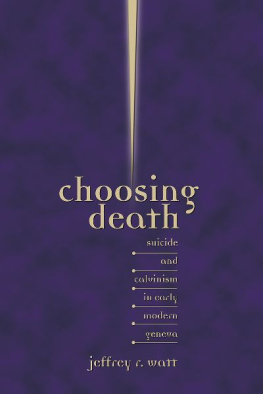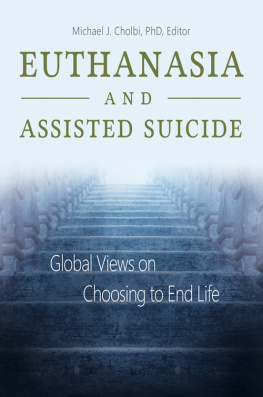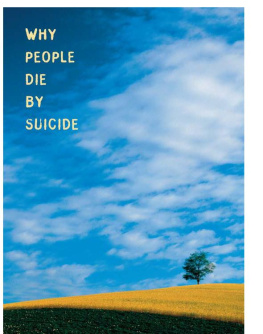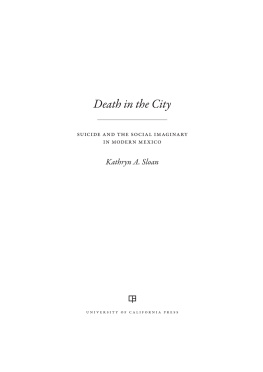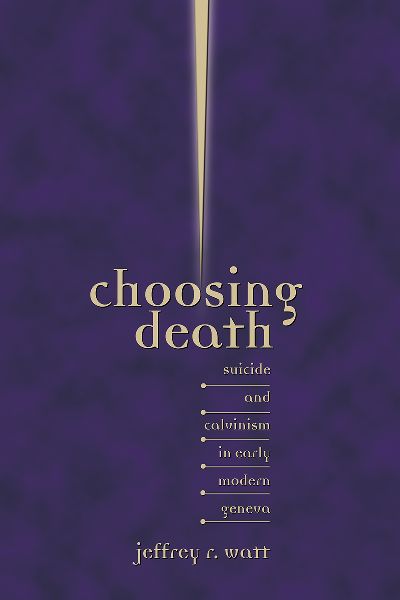
Choosing Death
Habent sua fata libelli
S IXTEENTH C ENTURY E SSAYS & S TUDIES S ERIES
G ENERAL E DITOR
R AYMOND A . M ENTZER
Montana State UniversityBozeman
E DITORIAL B OARD OF S IXTEENTH C ENTURY E SSAYS & S TUDIES
E LAINE B EILIN
Framingham State College
M IRIAM U . C HRISMAN
University of Massachusetts, Emerita
B ARBARA B . D IEFENDORF
Boston University
P AULA F INDLEN
Stanford University
S COTT H . H ENDRIX
Princeton Theological Seminary
J ANE C AMPBELL H UTCHISON
University of WisconsinMadison
C HRISTIANE J OOST- G AUGIER
University of New Mexico, Emerita
R OBERT M . K INGDON
University of Wisconsin, Emeritus
R OGER M ANNING
Cleveland State University
M ARY B . M C K INLEY
University of Virginia
H ELEN N ADER
University of Arizona
C HARLES G . N AUERT
University of Missouri, Emeritus
T HEODORE K . R ABB
Princeton University
M AX R EINHART
University of Georgia
J OHN D . R OTH
Goshen College
R OBERT V . S CHNUCKER
Truman State University, Emeritus
N ICHOLAS T ERPSTRA
University of Toronto
M ERRY W IESNER- H ANKS
University of WisconsinMilwaukee
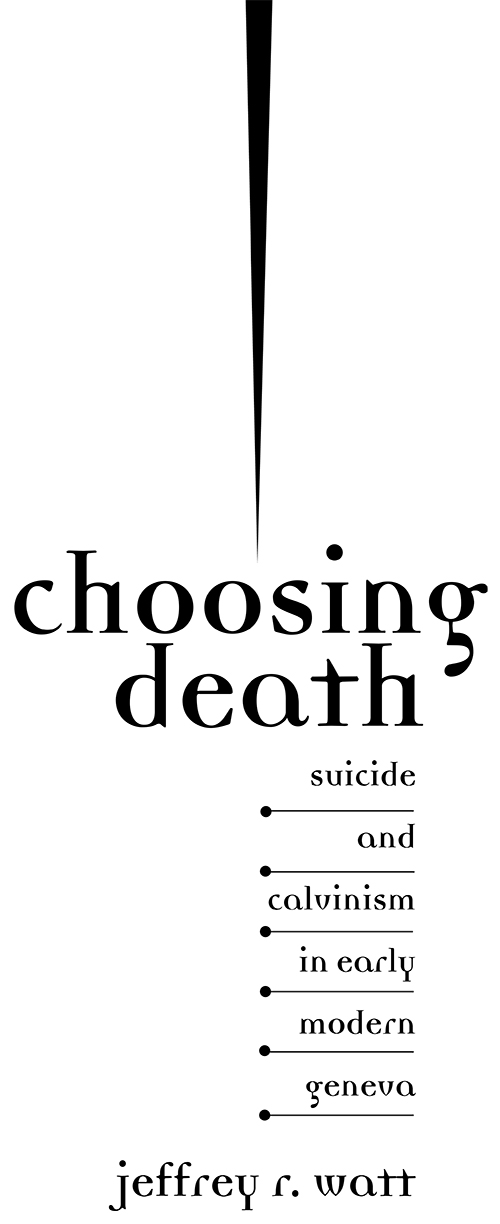
Copyright 2001 Jeffrey R. Watt
Published by Truman State University Press
Kirksville, MO 63501
www2.truman.edu/tsup
All rights reserved.
The Library of Congress has catalogued the print edition as follows:
Library of Congress Cataloging-in-Publication Data
Watt, Jeffrey R. (Jeffrey Rodgers), 1958
Choosing death : suicide and Calvinism in early modern Geneva / Jeffrey
R. Watt. p. cm. (Sixteenth century essays & studies)
Includes bibliographical references and index.
ISBN 0-943549-87-6 (pbk. : alk. paper) ISBN 0-943549-81-7 (casebound : alk. paper)
1. SuicideSwitzerlandHistory. 2. CalvinismSwitzerlandHistory16th century. I. Title. II. Series.
HV6548.S9 W37 2001
362.2809494dc21
Cover design: Teresa Wheeler, Truman State University designer
Text is set in Adobe Garamond 11/14
Printed in the United States of America
No part of this work may be reproduced or transmitted in any format by any means, electronic or mechanical, including photocopying and recording, or by any information storage or retrieval system, without permission in writing from the publisher.
The paper used in this publication meets the minimum requirements of the American National Standard for Permanence for Printed Library Materials Z39.48, 1984.l
To my parents
Contents
Map
Tables
[x] Since beginning work on this book in the summer of 1990, I have received invaluable assistance, encouragement, and criticism from many different sources. In Geneva I had the privilege of working in what must be Europes best-organized archives for Old Regime sources. I thank the staff of the Archives dEtat for their diligence and indulgence in accommodating my requests to consult incredible numbers of documents. My greatest debt in Geneva is surely to Dr. Barbara Roth-Lochner, associate archivist, who conscientiously directed me to pertinent documents and patiently answered my countless queries about Genevan sources and historiography. Although her assiduous assistance in the archives was crucially important, Barbara went the extra mile by reading in minute detail the entire book manuscript, making some valuable suggestions for changes. Even more, though, I thank Barbara and Professor Robert Roth for their very warm friendship and hospitality.
During my various stays in Switzerland, I befriended other Genevan historians, who also generously shared with me their knowledge of Genevan sources and history. With fond memories, I thank Drs. Michel Porret, Frdric Sardet, Dominique Zumkeller, Bernard Lescaze, and the late Gabriella Cahier-Buccelli. Very special thanks go to Dr. Liliane Mottu-Weber, who helped me on so many occasions, kindly sharing with me her time and expertise in the social and economic history of Geneva. I also am most grateful to Dr. Antoinette Emch-Driaz, a native of Geneva, who read the manuscript in meticulous detail and suggested many useful changes, particularly with respect to the history of medicine.
While the bulk of research was conducted in the state archives, I also consulted some sources at the Institut dHistoire de la Rformation at the Universit de Genve. For helping me identify pertinent literary and theological [xi] sources on early modern suicide, I am most grateful to Drs. Francis Higman, Alain Dufour, Reinhard Bodenmann, and especially Max Engammaremy heartfelt thanks to Max and Dr. Isabelle Engammare-Malaise for their generosity in sharing ideas and for their warm hospitality.
My summer research stays in Geneva fortunately often coincided with those of my mentor, Professor Robert Kingdon, who on countless occasions shared his ideas with me, offering invaluable constructive criticism on this project. Thanks also to Dr. Thomas Lambert, friend, colleague, and paleographer extraordinaire, who gave me some useful tips while I was in Geneva, and to Karen Spierling, who checked on some details in the archives when I could not be in the city of Calvin.
On this side of the Atlantic, I received important guidance from Professor Michael MacDonald, whose work on suicide I greatly admire, and from Professors Barbara Diefendorf and James Farr. Here at the University of Mississippi, I am grateful for encouragement and suggestions from my colleagues Professors Lester Field, Kees Gispen, Robert Haws, and Winthrop Jordan. Many thanks are also due to Paul Thayer, who graciously shared his linguistic skills and encyclopedic knowledge of the history of ideas, and to the industrious staff of the H. Henry Meeter Center at Calvin Seminary for their assistance in identifying works by Calvin that are germane to the subject under study. Professor David Greenberg kindly directed me to the most pertinent recent sociological literature on suicide.
Highest commendations go to Professor Raymond Mentzer, general editor of the Sixteenth-Century Essays and Studies monograph series, and to Paula Presley, director of Truman State University Press, for the very professional and efficient manner in which they have handled the evaluation of the manuscript and the publication of this book.
I gratefully acknowledge the generous support I received from the National Endowment for the Humanities and from the University of Mississippis College of Liberal Arts and Office of Research, which helped make my sojourns in Geneva possible.
More personally, my biggest debt, as always, is to my wife, Isabella. During our stays in Geneva, she often set aside her own work to go to the archives and peruse with me the haunting accounts of untimely deaths among early modern Genevans. She has not only served as my computer guru but has cheerfully endured over the past decade many a conversation [xii] about the morbid subject of suicide. Though not with us when this project began, Julia and Erica have made two happy people even happier. Finally, I thank my parents, Jim and Joan Watt, for their continued moral support and interest in my scholarly pursuitthough it has now been twenty years, I am still thankful that they did not object when I chose graduate studies in history over law school!
I have incorporated into this book material that has appeared in different form in the

